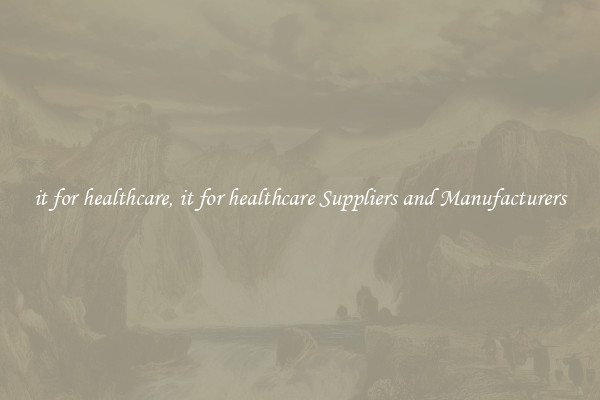it for healthcare, it for healthcare Suppliers and Manufacturers
Title: The Importance of IT for Healthcare Suppliers and Manufacturers

Introduction:
In today's fast-paced digital era, the importance of information technology (IT) in the healthcare industry cannot be overstated. IT plays a crucial role in improving efficiency, streamlining processes, enhancing patient care, and ensuring the overall success of healthcare suppliers and manufacturers. In this article, we highlight the various ways in which IT empowers healthcare suppliers and manufacturers to deliver better healthcare outcomes.
Enhancing Supply Chain Management:
IT systems provide healthcare suppliers and manufacturers with unparalleled visibility and control over their supply chain. With the help of robust software solutions, organizations can automate and streamline inventory management, procurement, and distribution processes. Real-time data integration allows for better forecasting and demand planning, preventing stockouts and obsolescence. Such efficiency not only reduces costs but also ensures that healthcare providers receive the necessary supplies on time, thereby improving patient care.
Quality Control and Compliance:
Maintaining quality standards and regulatory compliance is a top priority for healthcare suppliers and manufacturers. IT solutions help automate quality control processes, ensuring adherence to necessary regulations, safety protocols, and quality management systems. By utilizing digital platforms for documentation, audits, and reporting, healthcare organizations can reduce errors, standardize operations, and provide evidence of compliance during regulatory inspections.
Integration and Interoperability:
One of the significant challenges in healthcare lies in the seamless exchange of information between different systems, departments, and healthcare providers. IT facilitates integration and interoperability, enabling suppliers and manufacturers to connect with customers, healthcare providers, and other stakeholders. This seamless data exchange promotes better collaboration, more accurate information sharing, and improved decision-making processes. By implementing electronic health record systems, healthcare suppliers and manufacturers can contribute to a more holistic and patient-centric approach to care.
Data Analytics and Business Intelligence:
The vast amounts of healthcare data generated daily can be harnessed through IT tools to gain valuable insights. Robust data analytics and business intelligence systems help healthcare suppliers and manufacturers make data-driven decisions. Through advanced analytics techniques, organizations can track and analyze trends, identify opportunities for cost reduction, optimize resource allocation, and develop tailored marketing strategies. This information empowers organizations to stay ahead of the curve and adapt to evolving customer demands and market dynamics.
Conclusion:
IT has revolutionized the healthcare industry, providing suppliers and manufacturers with a competitive edge. By leveraging technology, healthcare organizations can enhance supply chain management, ensure regulatory compliance, improve collaboration, and capitalize on data-driven insights. Embracing IT solutions generates a positive ripple effect throughout the healthcare ecosystem, ultimately enhancing patient care delivery and outcomes. As the healthcare landscape continues to evolve, IT will remain an indispensable ally for suppliers and manufacturers, enabling them to navigate the challenges and drive innovation in the ever-changing healthcare milieu.

View details

View details

View details

View details








